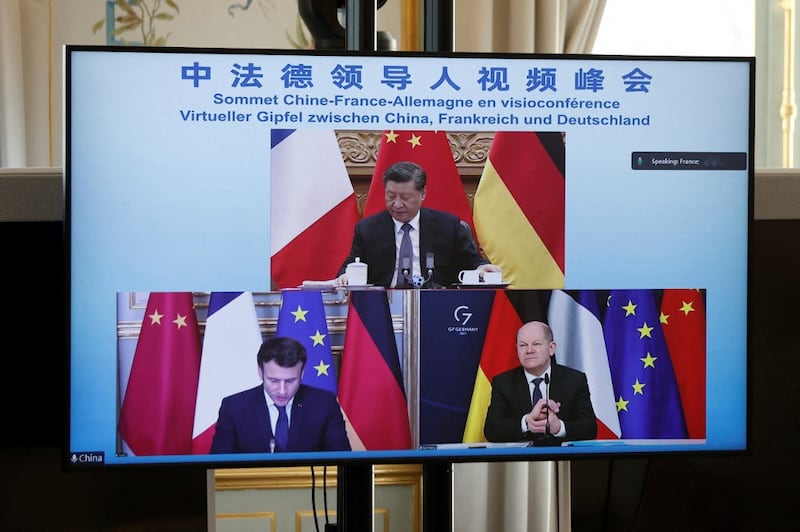As CIA director William Burns warned lawmakers in Washington not to underestimate Chinese Communist Party (CCP) leader Xi Jinping, analysts said Beijing is highly unlikely to start any military action against its democratic neighbor ahead of the CCP congress later this year.
Burns told the House of Representatives intelligence committee on Tuesday that China appeared to have been "unsettled" by the difficulties Russia has faced since it invaded Ukraine.
"I would just say analytically, I would not underestimate President Xi and the Chinese leadership's determination with regard to Taiwan," Burns told the committee.
"I do think ... that they have been surprised and unsettled to some extent by what they've seen in Ukraine over the last 12 days, everything from the strength of the Western reaction to the way in which Ukrainians have fiercely resisted," he added.
He said Beijing hadn't likely anticipated the reputational damage done to the CCP by its close relationship with Russian president Vladimir Putin.
He said the international response to Ukraine would likely have an impact on Beijing's projections regarding any invasion of Taiwan, which has never been ruled by the CCP, nor formed part of the People's Republic of China.
The war in Ukraine has prompted widespread concern in Taiwan that Xi could invade the island while the rest of the world is distracted by the war in Ukraine.

Unprecedented third term
Chieh Chung, a research fellow at Taiwan's National Policy Foundation, said Xi is currently in a fairly unassailable position of power at the helm of the CCP, and is unlikely to want to jeopardize that as he seeks an unprecedented third term in office.
"Xi Jinping is in a position of certainty right now, and if he were to take military action in the Taiwan Strait, the outcome of which isn't so certain, he would just be making trouble for himself," Chieh told RFA.
He said the U.S. military presence in the Indo-Pacific region, particularly its navy and air force, hadn't been affected by the war in Ukraine.
Titus Chen, associate professor of political science, at Taiwan's National Sun Yat-sen University in Kaohsiung, said Xi will likely view any action against Taiwan as too risky ahead of the CCP's 20th party congress later this year.
"There would be a huge degree of uncertainty, and such a war would be so costly," Chen said. "Taiwan would be destroyed, along with China's southeastern coast."
"Then, international isolation and lot of sanctions, which would really hurt the Chinese people, and that wouldn't be a good thing for him," he said. "So he'll be wanting to at least put on a peaceful face until after the 20th party congress."
Taiwan's world-leading semiconductor manufacturer, TSMC, declined to comment on Wednesday when asked if it had stopped chip exports to Russia, in keeping with Taipei's pledge to join international sanctions against Putin and his government.
"TSMC has always followed relevant laws and regulations wherever they apply in the world," the company said in a written response to RFA's question. "There is no other relevant information to make public at present."
Chip dependency
Tsui Lin, associate professor at Taiwan's Tamkang University, said Russia is heavily dependent on chip imports, with TSMC currently producing two Russian processor brands: Elbrus and Baikal.
"Russia is dependent on Taiwan-made semiconductor chips, for everything from laptops to military equipment, so cutting of this supply will have a huge impact on them," Tsui told RFA. "For now, Russia can make up the gap in supply by cooperating with China's SMIC, but TSMC remains the best choice of foundry, globally speaking."
Liu Pei-chen, a researcher and industrial consultant at the Taiwan Economic Research Institute, agreed, saying China's most advanced semiconductor chip produced so far is only 28 nanometers.
"So far it hasn't announced the production of a 14 nanometer chip ... which is still in the pipeline, so [China] won't be able to fill Russian demand for the more advanced chips," Liu said.
"Russia's military, emerging technologies, artificial intelligence, quantum computing, virtual reality, augmented reality, high-performance computing, and advanced weapon systems ... all rely on TSMC's high-tech chips,” he said.
If Taiwan is stopping the supply from TSMC, it will stop any Russian military technological advancement in its tracks, according to Su Tze-yun, analyst at Taiwan's national defense ministry.
"Russia has been sending integrated circuit designs to TSMC for production," Su said. "[Sanctions] will affect their ability to develop new, high-tech equipment in the longer term."
He added: "Also, it seems that Russia doesn't trust Chinese IT products. TSMC is an important source of IT equipment for national security agencies, whether intelligence or military."
The Russian government on Monday included Taiwan in a list of countries "unfriendly" to Russia, along with the U.S., the E.U., the U.K, Australia, New Zealand and Japan, Russian media reported.
Translated and edited by Luisetta Mudie.

